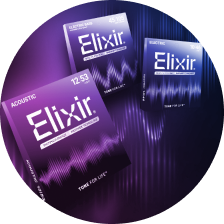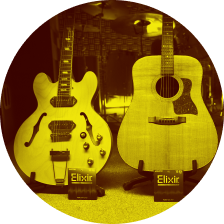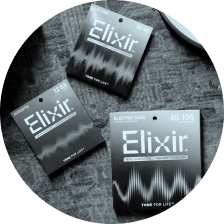CHOOSING YOUR STRINGS
Find the string option that fits your style.
CHOOSING STRINGS
How to Choose Guitar Strings:
The Basics
You've got a setup worthy of a multi-platinum rock god. Vintage guitars. Boutique basses. Megawatt amps and pedals as far as the eye can see. It's easy to forget the importance of choosing the right strings, but if you neglect this vital link in the chain, your performance will never reach its full potential.
Buying the right strings is the fastest and most economical way to boost your setup. Great strings give you glorious tone, comfortable feel and reliability from gig-to-gig. Bad strings make your songs plod, your fingers sore and your wallet a little emptier each night when the 'E' string pings off.
You might think of strings as a no-brainer purchase, but they are not all created equal. So whether you are about to string up your first instrument or frustrated with your current brand, here are four key factors to remember:
How to Choose Guitar Strings:
The Basics
You've got a setup worthy of a multi-platinum rock god. Vintage guitars. Boutique basses. Megawatt amps and pedals as far as the eye can see. It's easy to forget the importance of choosing the right strings, but if you neglect this vital link in the chain, your performance will never reach its full potential.
Buying the right strings is the fastest and most economical way to boost your setup. Great strings give you glorious tone, comfortable feel and reliability from gig-to-gig. Bad strings make your songs plod, your fingers sore and your wallet a little emptier each night when the 'E' string pings off.
You might think of strings as a no-brainer purchase, but they are not all created equal. So whether you are about to string up your first instrument or frustrated with your current brand, here are four key factors to remember:
Choosing the Best Acoustic Strings, Electric Strings or Bass Strings for You.
Choose Guitar Strings for Tone that Lasts
Most natural strings are quick to lose tone. Although cheaper to buy, they allow dirt from your fingers to build up in the exposed windings, inhibiting vibrations and killing tone. Guitar strings with Elixir® Technology will initially cost a little more, but they pay you back, thanks to Technology that keeps gunk out and tone alive. Elixir wound Strings with ultra-thin NANOWEB®, POLYWEB® and OPTIWEB® Technology protect both the outer string surface and the spaces between the windings. Meanwhile, our Anti-Rust Plated Plain Steel strings ensure longer tone life for the entire set.
Great Tone Starts with the Right String Material
The metal alloy used for a guitar string's wrap wire has a huge impact on tone and feel, so find the material that suits your songs and playing style. Some alloys are naturally bright, while others are dark and warm. In terms of playability, stainless steel guitar strings feel very different beneath the fingers to nickel plated ones. Elixir Strings offer coated guitar strings in a range of different alloys for you to discover.
Roundwound, Half Round or Flatwound?
The 'plain' treble strings in a set are straightforward; the lower 'wound' strings are where things get subjective. At the center of each wound string you will find a metal core, around which the string windings are wrapped. The wrap wire comes in three profiles. Elixir Strings are Roundwound, by far the most popular format with a comfortable ribbed texture and brighter sound. Half Round strings are ground down to give smoother feel and warmer tone, while Flatwound strings have an ultra-smooth surface and a vintage sound that makes them popular for mellow, jazzy playing. Experiment until you find the profile that is right for you.
String Gauge – The Magic Number
String gauge is the measurement of a string's thickness and tells you the tone and feel you can expect. Standard sets for guitar range from super-light to heavy. While the gauge difference might seem minuscule, it can transform playability. To reach a given pitch, heavier strings need to be put under more tension. Although they typically give a bolder sound, it takes more pressure to fret and bend notes. With light strings, the reverse is true. When choosing the gauge that suits you, remember in addition to offering a range of standard sets, Elixir Strings are also available as single strings, so you can build your own custom set.
Choose Guitar Strings for Tone that Lasts
Most natural strings are quick to lose tone. Although cheaper to buy, they allow dirt from your fingers to build up in the exposed windings, inhibiting vibrations and killing tone. Guitar strings with Elixir® Technology will initially cost a little more, but they pay you back, thanks to technology that keeps gunk out and tone alive. Elixir wound Strings with ultra-thin NANOWEB®, POLYWEB® and OPTIWEB® technology protect both the outer string surface and the spaces between the windings. Meanwhile, our Anti-Rust Plated Plain Steel strings ensure longer tone life for the entire set.
Great Tone Starts with the Right String Material
The metal alloy used for a guitar string's wrap wire has a huge impact on tone and feel, so find the material that suits your songs and playing style. Some alloys are naturally bright, while others are dark and warm. In terms of playability, stainless steel guitar strings feel very different beneath the fingers to nickel plated ones. Elixir Strings offer coated guitar strings in a range of different alloys for you to discover.
Roundwound, Half Round or Flatwound?
The 'plain' treble strings in a set are straightforward; the lower 'wound' strings are where things get subjective. At the center of each wound string you will find a metal core, around which the string windings are wrapped. The wrap wire comes in three profiles. Elixir Strings are Roundwound, by far the most popular format with a comfortable ribbed texture and brighter sound. Half Round strings are ground down to give smoother feel and warmer tone, while Flatwound strings have an ultra-smooth surface and a vintage sound that makes them popular for mellow, jazzy playing. Experiment until you find the profile that is right for you.
String Gauge – The Magic Number
String gauge is the measurement of a string's thickness and tells you the tone and feel you can expect. Standard sets for guitar range from super-light to heavy. While the gauge difference might seem minuscule, it can transform playability. To reach a given pitch, heavier strings need to be put under more tension. Although they typically give a bolder sound, it takes more pressure to fret and bend notes. With light strings, the reverse is true. When choosing the gauge that suits you, remember in addition to offering a range of standard sets, Elixir Strings are also available as single strings, so you can build your own custom set.





